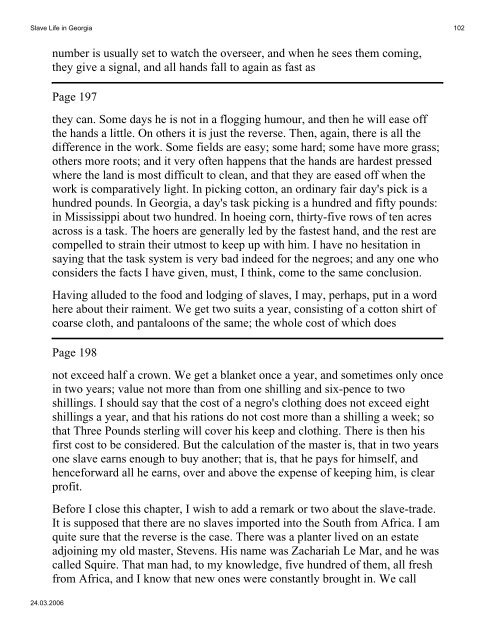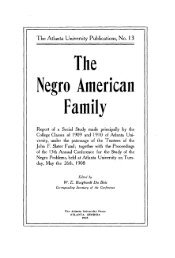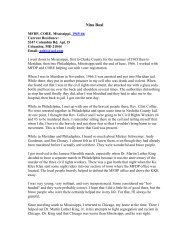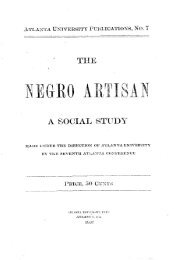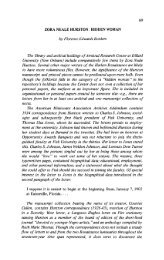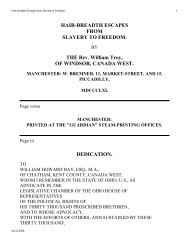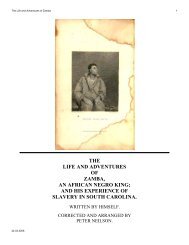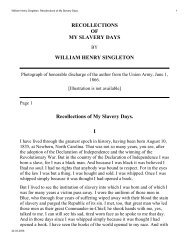Slave Life in Georgia - African American History
Slave Life in Georgia - African American History
Slave Life in Georgia - African American History
You also want an ePaper? Increase the reach of your titles
YUMPU automatically turns print PDFs into web optimized ePapers that Google loves.
<strong>Slave</strong> <strong>Life</strong> <strong>in</strong> <strong>Georgia</strong> 102<br />
number is usually set to watch the overseer, and when he sees them com<strong>in</strong>g,<br />
they give a signal, and all hands fall to aga<strong>in</strong> as fast as<br />
Page 197<br />
they can. Some days he is not <strong>in</strong> a flogg<strong>in</strong>g humour, and then he will ease off<br />
the hands a little. On others it is just the reverse. Then, aga<strong>in</strong>, there is all the<br />
difference <strong>in</strong> the work. Some fields are easy; some hard; some have more grass;<br />
others more roots; and it very often happens that the hands are hardest pressed<br />
where the land is most difficult to clean, and that they are eased off when the<br />
work is comparatively light. In pick<strong>in</strong>g cotton, an ord<strong>in</strong>ary fair day's pick is a<br />
hundred pounds. In <strong>Georgia</strong>, a day's task pick<strong>in</strong>g is a hundred and fifty pounds:<br />
<strong>in</strong> Mississippi about two hundred. In hoe<strong>in</strong>g corn, thirty-five rows of ten acres<br />
across is a task. The hoers are generally led by the fastest hand, and the rest are<br />
compelled to stra<strong>in</strong> their utmost to keep up with him. I have no hesitation <strong>in</strong><br />
say<strong>in</strong>g that the task system is very bad <strong>in</strong>deed for the negroes; and any one who<br />
considers the facts I have given, must, I th<strong>in</strong>k, come to the same conclusion.<br />
Hav<strong>in</strong>g alluded to the food and lodg<strong>in</strong>g of slaves, I may, perhaps, put <strong>in</strong> a word<br />
here about their raiment. We get two suits a year, consist<strong>in</strong>g of a cotton shirt of<br />
coarse cloth, and pantaloons of the same; the whole cost of which does<br />
Page 198<br />
not exceed half a crown. We get a blanket once a year, and sometimes only once<br />
<strong>in</strong> two years; value not more than from one shill<strong>in</strong>g and six-pence to two<br />
shill<strong>in</strong>gs. I should say that the cost of a negro's cloth<strong>in</strong>g does not exceed eight<br />
shill<strong>in</strong>gs a year, and that his rations do not cost more than a shill<strong>in</strong>g a week; so<br />
that Three Pounds sterl<strong>in</strong>g will cover his keep and cloth<strong>in</strong>g. There is then his<br />
first cost to be considered. But the calculation of the master is, that <strong>in</strong> two years<br />
one slave earns enough to buy another; that is, that he pays for himself, and<br />
henceforward all he earns, over and above the expense of keep<strong>in</strong>g him, is clear<br />
profit.<br />
Before I close this chapter, I wish to add a remark or two about the slave-trade.<br />
It is supposed that there are no slaves imported <strong>in</strong>to the South from Africa. I am<br />
quite sure that the reverse is the case. There was a planter lived on an estate<br />
adjo<strong>in</strong><strong>in</strong>g my old master, Stevens. His name was Zachariah Le Mar, and he was<br />
called Squire. That man had, to my knowledge, five hundred of them, all fresh<br />
from Africa, and I know that new ones were constantly brought <strong>in</strong>. We call<br />
24.03.2006


